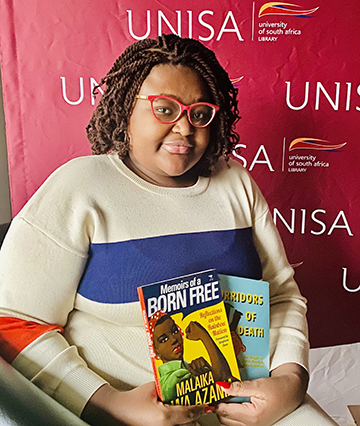News & Events
“Black women are never allowed to be tired”
“You cannot pour from an empty cup.” These were the words of Malaika Mahlatsi, popularly known as Malaika Wa Azania, when she recently spoke at the Unisa Library Conversation Series.

Malaika Mahlatsi "Malaika Wa Azania"
Mahlatsi directed these words to the youth of South Africa, particularly young black women, urging them to attend to their emotional and mental wellness during the COVID-19 crisis. “Young people are under pressure, and it is curious that it took this moment for me to finally start prioritising my mental health,” she said.
Livelihoods in the balance
Mahlatsi added that COVID-19 did not just take away loved ones, colleagues and comrades. “It took away our sense of security,” she said. “We woke up one day and our source of livelihood was seriously threatened.”
Mahlatsi spoke about the serious financial threat to scores of young people who not only have to sustain themselves, but also care for family members, relatives and other students. She brought to the fore the real issue of ‘black tax’ that many young black graduates face, and the threat that COVID-19 has brought to their livelihoods.
“It was absolutely debilitating how COVID-19 took away our sense of security of being able to look after one another,” she said. “People have to pause and admit that they are tired in order for mental and emotional health work to be prioritised. I have never been more serious about my mental health than I am today, right now.”
‘A psychologically haemorrhaging experience’
Mahlatsi said that black women are never allowed to be tired. “Our pain is politicised, we are celebrated for our strength,” she said. “Black women, in particular, are expected to be superhuman, which is a gruelling and absolutely psychologically haemorrhaging experience. Black youth, and young black women in particular, need support, protection and solidarity so that their humanity is not disregarded.”
Speaking about her experiences as a ‘born free’, Mahlatsi cited the challenges that her peers face today, which are similar to those faced by youth during apartheid – issues like black tax, racism and lack of resources. “Some of these struggles have changed somewhat but their texture remains very similar,” she said
In both her bestselling books, Memoirs of a Born Free: Reflections on the Rainbow Nation (Jacana Media, 2014) and Corridors of Death: The Struggle to Exist in Historically White Institutions (BlackBird, 2020) the author critically analyses the challenges faced by young black people, highlighting the odds they are up against. She challenges the post-apartheid era, indicating that black youth have inherited the challenges of an apartheid South Africa. She highlighted the importance of institutions of higher learning in humanising black youth. “We have to be treated with dignity, it is our right,” she said. “Where do black people go for healing?”
The international speaker also commended women in higher learning institutions, singling out Unisa Vice-Chancellor Professor Puleng LenkaBula for her role as a student-centred leader who insists on the humanity and dignity of black youth. “I am grateful to Professor LenkaBula for the type of student-centred leader she is,” she said.
A time for solidarity
For Mahlatsi, black youth issues are inseparable from women’s issues. “We experienced how our mothers set themselves on fire to keep us warm and it is now time for us to be in solidarity with black women leaders,” she said.
The high-profile speaker and author is an award-winning essayist and columnist, published in various publications including Thought Leader, the WOZ (Switzerland), the African Independent and The Thinker magazine, to name but a few. Her insight into the status of black youth and their place and role in academic institutions has been useful in a variety of national and international debates.
She also authored the foreword to We Are No Longer at Ease: The Struggle for #FeesMustFall by Busani Ngcaweni and Wandile Ngcaweni (eds) and co-authored a chapter in Mzansi Africa: The Contested Idea of South Africa by Professor Sabelo Ndlovu-Gatsheni and Busani Ngcaweni (eds).
The Facebook live conversation with Mahlatsi brought in comments and words of appreciation from students and other virtual audience members, who thanked her for infusing her political messages with the personal politics of self-care. The conversation – in parts 1 and 2 – is available on the Unisa Library Facebook page.
* By Natalia Molebatsi, Unisa Library Marketing Coordinator
Publish date: 2021/07/13
